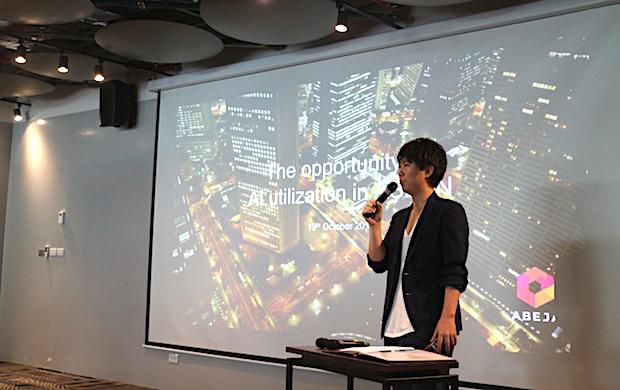
This guest post is authored by Hiroko Mamoto, Public Retalations at Bangkok-based recruiting platform startup TalentEx.

Image credit: Hiroko Mamoto
See the originl story in Jaapnese.
In partnership with Omise and Abeja – two outstanding and rapidly-growing startups in Southeast Asia led by Japanese entrepreneurs, the Japanese embassy in Thailand recently hosted a conference called Digital Transformation Summit (DX Summit for short) at the headquarters of Thai top property developer Ananda Development. The conference is a part of “Open Innovation Columbus (OIC)” through which the Japanese government and Thai conglomerates encourage strategic alliances between innovative Japanese startups and the Thai conglomerates.
Approximately 50 representatives from 30 Thai conglomerates participated in the first summit, along with 30 representatives from 30 major companies from Japan. In addition to government officials and media from both countries, Global Brain CEO Yasuhiko Yurimoto and KK Fund General Partner Koichi Saito also participated.
See also:
- Columbus charts course (Bangkok Post)
- Thailand, Japan join hands to develop local startups (Bangkok Post)
- เอกอัครราชทูตญี่ปุ่นประจำประเทศไทยสนับสนุน Start-up ญี่ปุ่น ลงทุนในไทย (Royal Thai Government)
OIC was launched with the goal of developing successful Japanese startups around the world and to meet the demand for state-of-the-art technology from the conglomerates lead by ASEAN. The Japanese government serves as mediator between the concerned parties, providing enriching support content such as matching and follow-ups, funds for expanding business in Thailand, and mentoring with Japanese entrepreneurs on the ground in Thailand.

Image credit: Hiroko Mamoto
The theme of this year’s DX Summit was AI (artificial intelligence) and blockchain, and one aim was to have designated knowledgeable persons assist the representatives from Thai conglomerates in gaining a deeper understanding of digital technology. Abeja Singapore Representative Naoki Tonogi and Omise Holdings CEO Jun Hasegawa served as speakers during the seminar.
Tonogi spoke passionately about technology up to present day that did not yet have AI, and how AI is innovative by answering the straightforward question, “What is AI?” He also introduced practical examples of AI provided by Abeja, and based on those, he discussed the future of AI technology and market considerations.

Image credit: Hiroko Mamoto
Hasegawa in turn used an explanation of products offered by Omise to showcase concrete examples of how blockchain can be used. His explanation included a basic outline, as well as the characteristics and merits of blockchain technology, and participants gains further understanding through question and answer time.
See also:
- Japan’s Withfluence ties up with Thai telco True to boost influencer marketing in Asia
- Japan, Thai startups unite to support younger selves; Inaugural meeting held with ministers
Japan’s Ambassador to Thailand, Shiro Sadoshima, imparted these words following the DX Summit.
I anticipate positive results through the cooperation of the decidedly flexible Thai companies and the technology and speed of Japanese startups.
Omise’s Hasegawa, who also serves as Chairman of the Japan-ASEAN Innovation Support Network (JAIS) [1] , related the following.
Just through breaching language barriers/ culture barriers/ market barriers, the methods of doing business can be improved. This is why, even as an entrepreneur myself who can understand the pain of doing business abroad, I’d like to continue to support events such as this which provide a space to connect with local companies.
Prior to the OIC, Sadoshima meets with Thai Prime Minister Kobsak Pootrakool to discuss cooperative relations

Image credit: Office of the Prime Minister, Thailand
Representatives from the Thai conglomerates also shared their positive impressions of the seminar.
Thanapong Na Ranong, First Senior Vice President of Kasikornbank / Managing Director of Kasikornbank’s investment arm Beacon Venture Capital, says,
I am very excited about this event and any future efforts. As the cultures of Japan and Thailand are very close, I expect good outcomes. After listening to today’s seminar, I’d like to try out the technologies with robots first.
Lena Ng, Chief Investment Officer at Amata Corporation, says,
We are developing a smart city in an industrial area, and there are many Japanese companies in the industrial area managed by our company. We believe we can use AI and blockchain technology to develop smart business in our industrial area, and this is why we’d like to incorporate it.
OIC plans to hold pitch events and arrange matching opportunities for Thai conglomerates and Japanese startups within the year.
Translated by Amanda Imasaka
Edited by Masaru Ikeda
- There are separate organizations for each country under JAIS: JTIS (Japan-Thailand), JMIS (Japan-Malaysia), JVIS (Japan-Vietnam), JIIS (Japan-Indonesia), JPIS (Japan-Philippines), JSIS (Japan-Singapore). For more information on the initiations of the first organization, JTIS, please see here. ↩





































